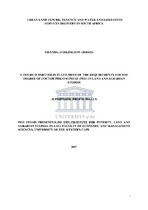Urban land tenure, tenancy and water and sanitation services delivery in South Africa
Abstract
The aim of the study was to develop a clear understanding of the relationship between land
tenure, tenancy and water and sanitation services development planning and delivery in the
context of rapid urbanisation in post-apartheid South Africa. The study revolved around
mismatches which exist due the largely binary polarisation of urban land tenure in the form
of the 'formal' and 'informal' view by municipalities which rely on technocratic approaches
on one hand, and fragmented, sectorial interventions, to basic services delivery on the other.
In addressing the problem for the research, emphasis was on lower-income working class
neighbourhoods in the Western Cape Province, City of Cape Town in particular. Using a
mixed methods approach where both quantitative and qualitative methods were used, data
was collected from the following study sites: Nkanini (Khayelitsha), Mshini Wam (Joe Slovo
Park, Milnerton), Langa (Old Hostels) and Kensington. These study sites were carefully
selected for contrast and comparison, as the initial research in the area has revealed various
prior tenure arrangements.

